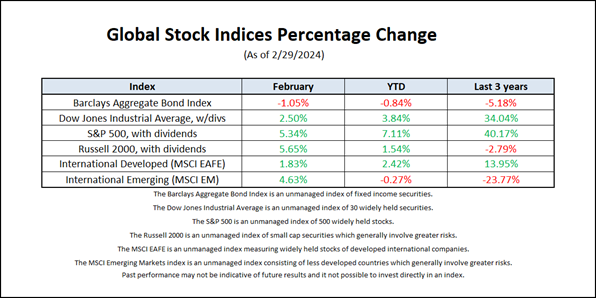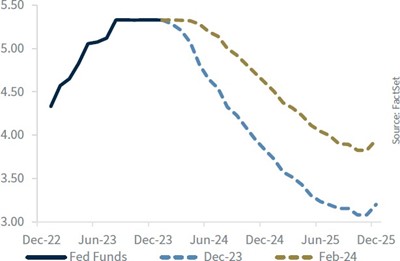“It’s not uncertainty as such that bothers us, but unknowledge.” ~ Peter Bernstein
Prologue
In February, the stock market demonstrated remarkable resilience. Domestic equity benchmarks closed the month on a strong note, with both the Nasdaq and S&P 500 achieving all-time highs. Notably, inflation data aligned with expectations, providing further support for stock prices.
February’s gains extended a positive trend, marking the fourth consecutive month of advances for the S&P 500, the Dow, and the Nasdaq. Year- to-date, the Nasdaq and S&P 500 have surged approximately 7.0%, while small-cap stocks represented by the Russell 2000 have successfully recovered from their losses in January.
I came across the following metaphor and I thought it worth sharing. In the vast expanse of financial markets, where algorithms churn data and traders race against time, perhaps we can find wisdom in the humblest of places – a sun-kissed field, a seasoned farmer, and the rhythmic cycle of planting and harvest.
Think like a farmer
- Don’t shout at the crops
- Don’t blame the crop for not growing fast enough
- Don’t uproot crops before they’ve had a chance to grow Choose the best plants for the soil
- Irrigate and fertilize Remove weeds
- Remember you will have good seasons and bad seasons – you can’t control the weather only be prepared for it
The farmer’s wisdom offers valuable lessons for both life and investing. Patience, responsibility, and stability – these are the farmer’s virtues. Just as crops need time to yield, portfolios require nurturing. Adaptation, resilience, and thoughtful care lead to fruitful investment growth. So, let’s tend our financial fields with diligence, knowing that, like a well-tended harvest, our efforts will bear fruit over time.
Please reach out with questions.
-Paul
Noteworthy links:
- Capital Group: What’s right with the world
- AQR: Why Not 100% Equities
- RBA: How to avoid another lost decade in equities
- Allan Roth: The Law and Strategies to Convert a College 529 to a Roth

Chart of the Month
Expectations of a Fed cut have fallen

Article of the Month
Uncertainty Is Underrated
By David Booth, Founder and Chairman of DFA, published January 31st, 2024.
“A wave of new scientific discoveries reveals that learning to lean into uncertainty in times of rapid change is a promising antidote to mental distress.” –Maggie Jackson, New York Times
For many people, uncertainty is something to avoid or at least mitigate. But what about the positive things that uncertainty can bring? Without it, there would be no surprises, no joy in watching sports, and no 10% average annualized return on the stock market over the past century.
Let me explain that last one: If there was no uncertainty, returns would be predictable and there would be no difference between putting your money in a savings account or investing it in the stock market. We’ve all lived through years like 2022 when the market went down a lot and years like 2023 when it went up a lot. The potential risk makes possible the potential reward. So thank goodness for uncertainty.
People often talk more about the downside to uncertainty than its upside. There’s even a term—loss aversion—that reflects how a loss can feel more painful than a gain of an equal amount. Maybe that’s why uncertainty is underrated.
Because of uncertainty, life is one cost-benefit analysis after another, and we have no choice but to manage risk. At the extremes, some people may try to completely ignore risk, while others might try to eliminate it. Then there’s everyone else. We can’t control the weather, but we can take an umbrella if it looks like it might rain. We weigh the cost of carrying around an umbrella against the benefit of staying dry if it rains. We manage risk with our health, work, family, and just about every other part of our life—including investing—because, while few things are certain, we still have to make decisions big and small.
The better we manage risk, the better our lives will be. Going back to the weather example, we want to carry an umbrella only when we might need one. When it comes to investing, you can’t manage stock market returns, but you can manage the risk you take. So how can investors get better at managing risk?
What to Avoid
One way of managing risk is to eliminate some of the things you shouldn’t do. No matter your personal view on health habits, there are certain things that research has shown are true for most people. Fried foods, cigarettes, and sugar don’t promote health. Avoiding these increases your chance of a healthy outcome. There are choices you can make to improve your chance of a good investing outcome, too. Don’t get caught up trying to predict the unpredictable. That means not trying to time the market or pick winning stocks.
What to Do
Then there are the positive ways of dealing with risk: capturing the benefits of what scientific research has shown us. With health, that means instead of consuming fried foods, cigarettes, and sugar, we should exercise more, eat more vegetables, and get regular checkups. Diversification allows us to reduce our risk while capturing the returns of the market. Dimensional started in 1981 with the goal of turning academic research into financial solutions, which we believe is a better way to invest.
With investing, we’ve learned that risk is more predictable than returns. So you want to plan and find the amount of risk that is right for you. Each person may be different. Regardless of what level of risk feels right, you should invest and be prepared for a range of outcomes. The more you have a philosophy you can count on and return to in times when you are experiencing the ups and downs of uncertainty, the more likely you are to succeed as a long-term investor.
You Can Do It
You know more than you think you do about investing—investing is all about risk and reward, and so is every other part of your life. You’ve been managing risk and reward for as many years as you’ve been living. With investing and life, some years are better than others, but the important thing is to be able to stick around to see what happens next. That’s why I see uncertainty as a positive force and have faith in the ability of people to find better ways to manage risk. I’ve worked with thousands of investors during my five decades in finance and seen how, when they manage risk better, they live a better life. Instead of trying to predict your future, plan, adapt, and figure out the most sensible solutions for you.
With uncertainty you make the best-informed choices you can, monitor the results, and make changes as necessary. Accepting outcomes doesn’t mean you don’t try to shape them where you can, or to take advantage of opportunities when they present themselves to you. You do your homework and learn to make tradeoffs between possible risk and reward. The key is to develop a philosophy, define your goals, and steer toward them, adjusting along the way. You might not only be underestimating uncertainty, but you may be underestimating the positive impact of embracing it.
Here is a link to the full article: Uncertainty Is Underrated
*Raymond James & Associates, Inc, member New York Stock Exchange/SIPC
*The information contained in this report does not purport to be a complete description of the securities, markets, or developments referred to in this material, and is not a recommendation. There is no guarantee that these statements, opinions or forecasts provided herein will prove to be correct.
*Views expressed are the current opinion of the author, but not necessarily those of Raymond James. The author’s opinions and forward looking statements expressed are subject to change without notice. This information does not constitute a solicitation or an offer to buy or sell any security. Information contained in this report was received from sources believed to be reliable, but accuracy is not guaranteed.
*There is no assurance any investment strategy will be successful. Investing involves risk and you may incur a profit or loss regardless of strategy selected, including diversification and asset allocation. Past performance may not be indicative of future results. International investing involves additional risks such as currency fluctuations, differing financial accounting standards, and possible political and economic instability. These risks are greater in emerging markets. Small- and mid-cap securities generally involve greater risks and are not suitable for all investors. Asset allocation and diversification do not guarantee a profit nor protect against a loss. Individual investor’s results will vary.
*Gross Domestic Product (GDP) is the annual market value of all goods and services produced domestically by the U.S. Past performances are not indicative of future results. Investing always involves risk and you may incur a profit or loss. No investment strategy can guarantee success.
*This information contains forward-looking statements about various economic trends and strategies. You are cautioned that such forward-looking statements are subject to significant business, economic and competitive uncertainties and actual results could be materially different. There are no guarantees associated with any forecast and the opinions stated here are subject to change at any time and are the opinion of the individual strategist. Data comes from the following sources: Census Bureau, Bureau of Labor Statistics, Bureau of Economic Analysis, the Federal Reserve Board, and Haver Analytics. Data is taken from sources generally believed to be reliable but no guarantee is given to its accuracy.
*Links are being provided for information purposes only. Raymond James is not affiliated with and does not endorse, authorize, or sponsor any of the listed websites or their respective sponsors. Raymond James is not responsible for the content of any web site or the collection or use of information regarding any web site’s users and or/members.
*Certified Financial Planner Board of Standards Inc. owns the certification marks CFP®, CERTIFIED FINANCIAL PLANNER™ and Federally registered CFP (with flame design) in the U.S., which it awards to individuals who successfully complete CFP Board’s Initial and ongoing certification requirements.
*The S&P 500 is an unmanaged index of 500 widely held stocks that is generally considered representative of the U.S. stock market.
*To opt out of receiving future emails from us, please reply to this email with the word “Unsubscribe” in the subject line. The information contained within this commercial email has been obtained from sources considered reliable, but we do not guarantee the foregoing material is accurate or complete.
Insights & Discovery